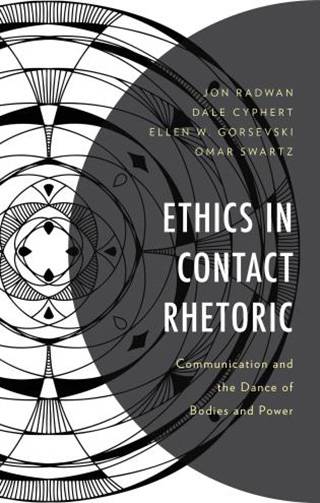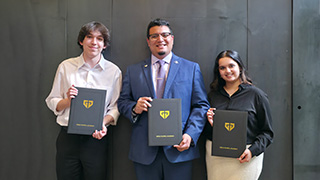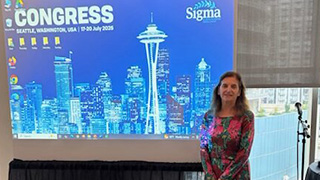Ethics in Contact Rhetoric Book Talk With Jon Radwan
Monday, April 28, 2025

Jon Radwan, Ph.D.
Jon Radwan, Ph.D., associate professor, Communication, College of Human Development, Culture, and Media and director of the Institute for Communication and Religion, at Seton Hall University, will be hosting a book talk on his recent publication, Ethics in Contact Rhetoric: Communication and the Dance of Bodies and Power, on Wednesday, April 30, 2025, from 9:30 a.m. to 10:45 a.m., EDT.
Also speaking will be co-authors Dale Cyphert, professor emerita, Wilson College of Business, University of Northern Iowa; Ellen W. Gorsevski, associate professor in the School of Media and Communication at Bowling Green State University, and Omar Swartz, associate professor of political science at the University of Colorado Denver. The discussion will focus on why Contact Rhetoric is an important orientation and will include a presentation on “How To Draw Communication” and an audience question and answer.
The book is the newest addition to Lexington’s "Studies in Contemporary Rhetoric" series. The book is aspirational, aiming to reorient communication theory by centering touch and decentering symbolic acts. Inspired by Martin Luther King’s tradition of nonviolent power, a contact orientation highlights the incarnate and immediate ground of communication ethics.
Ethics in Contact Rhetoric challenges media theory by shifting communication’s focal point from symbolic acts to physical contact. Where media work to disembody rhetors and emphasize individual agency over collective action, touch is co-felt and dance steps are physically real relational performances. By developing a “choreutic” account of embodied communication cycles, the authors recontextualize symbolism and provide insight into the role of rhetoric in social injustice and cultural transformation. To illustrate “relational gyres,” compelling case studies examine colonial human rights rhetoric, sabotage, nuclear deterrence, interspecies communication, bar fights, an insurrection, nonviolent direct action and terrorism.
Radwan notes, “Up close and personal, meaning is incarnated and value is felt in joint movement. As we grapple with daily challenges in interdependence and social being, let us dare to balance and integrate. Violence, domination and strife are not unpredictable chaotic forces, they are skewed relational cycles that can be analyzed and righted. Justice, mercy and beloved community are not impossible abstractions, they are physical performances open to observation, teaching and repetition. May all join all and swing temples of integral balance.”

Book cover for 'Ethics in Contact Rhetoric'
Praise from Reviewers
Theologian and religious studies scholar Jaroslav Franc, Th.D., Palacký University Olomouc, Czech Republic, writes “In an age dominated by digital media, Ethics in Contact Rhetoric offers a crucial reminder of the importance of physical presence and embodied interaction, urging us to reconsider how ethical communication can be maintained in increasingly virtual and mediated spaces. It challenges conventional rhetoric with a fresh perspective, centering dance as a powerful metaphor for understanding relational dynamics, justice and the fabric of social life; in its own words, “…human development begins in contact and later grows into language and media."
Janie M. H. Fritz, chair and professor of the Department of Communication and Rhetorical Studies at Duquesne University shares “this creative volume embodies ideas as a poetic dance of discourse. Refreshing and inspiring, ideas leap forth from a stunning array of classical and contemporary sources ranging across philosophy of communication, communication ethics, rhetoric and theology to open new opportunities for meaningful contact and enduring hope. Here is rhetoric in a genuinely new key. Astounding!"
The April 30 event is scheduled from 9:30 a.m. to 10:45 a.m., in the Walsh Library Common Area. While the event is free, attendees are requested to register to participate either in person or virtually, here.
To learn more about Contact Rhetoric, visit here.
About the Institute for Communication and Religion
The Institute for Communication and Religion is an affiliated unit within Seton Hall University’s College of Human Development, Culture and Media. Religious traditions are primary drivers for social action across humanity’s full moral range, from care through violence. Launched with THRUST funding in fall 2017, the institute is an interdisciplinary nexus for communication and media scholarship addressing the critical intersection between religion and society. Guided by "Nostra Aetate’s" spirit of ecumenical and interreligious cooperation, the institute seeks to engage in public dialogue and debate, promote academic inquiry and support religious dimensions of creativity. Our values are Seton Hall University values: servant leadership, curricular innovation and intellectual excellence. For more information, visit the Institute for Communication and Religion.
Categories: Arts and Culture, Faith and Service





